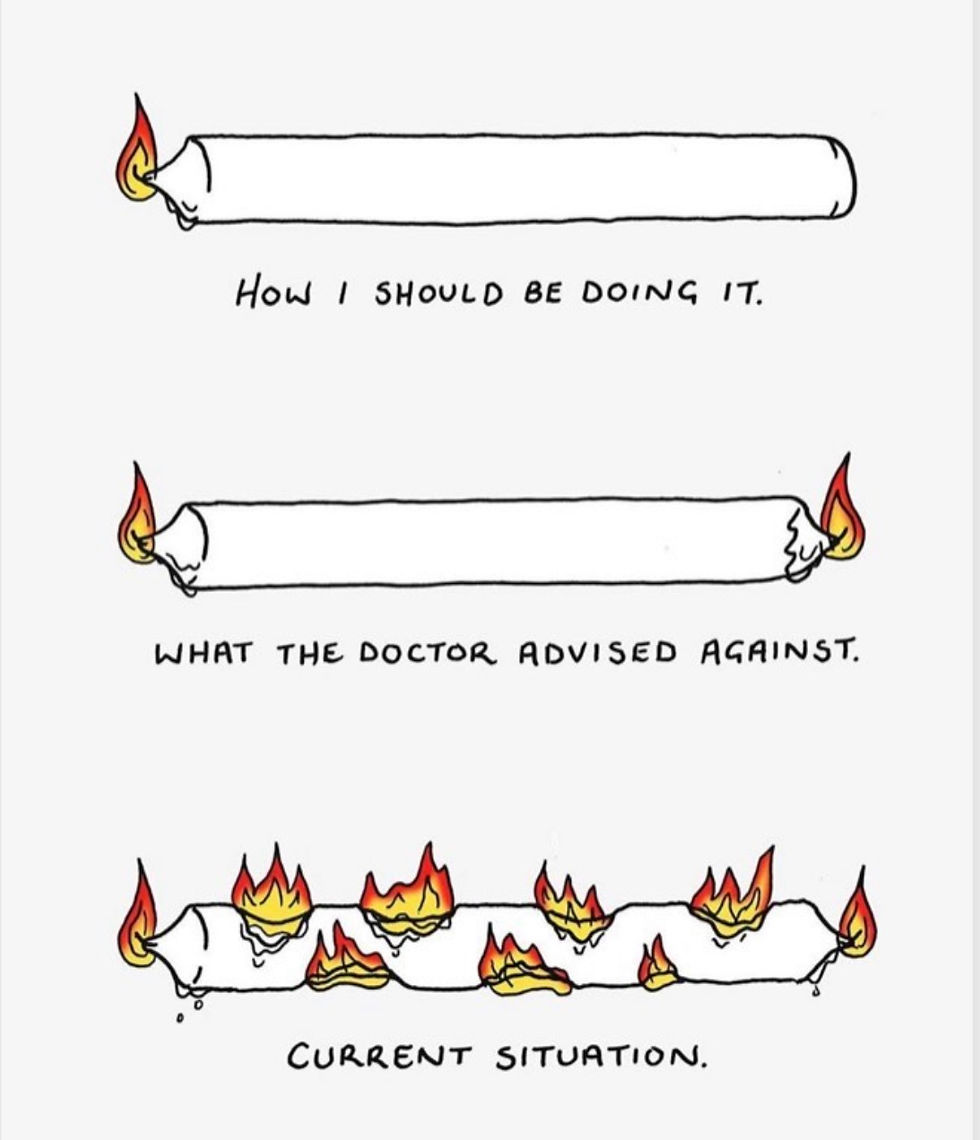PARENTAL BURNOUT
- Sep 8, 2019
- 4 min read

PARENTAL BURNOUT
Feeling Lost? Overwhelmed and easily agitated, snapping at children then being overcome with guilt for your impatience? How can anyone stay sane with all this going on?
Parental burnout is a thing and a very relevant and relatable feeling in this day and age, which is caused by chronic stress from parenting. Parenting alone is a challenging task but team that with how society today seems to demand so much more its inevitable that something is going to have to give and that something is our mental health and wellbeing!
The main characteristics are an overwhelming feeling of exhaustion because of being a parent, emotional distance from your kids and feeling ineffective.
Most parents have been there in one way or another. Frustrated and angry, they feel like lashing out at their kids or spouse. In most cases, that feeling passes and doesn't have a big effect on their lives.
But in serious cases, and left unchecked, the effects of burnout can be dangerous to both parents and their children.
For parents, burnout can cause sleep disorders, alcohol or drug use, thoughts of escape — or even thoughts of suicide. Burnout has severe consequences for couples, who can become irritable and detached from one another as life at home becomes increasingly volatile
“Parent burnout leads to an increase in verbal violence most of the time, but sometimes also physical violence. Parental burnout can be much more dangerous and damaging than even depression.”said Isabelle Roskam, a professor at Catholic University of Louvain in Belgium, one of the world’s leading researchers on the topic.
Burnout has been study for years however there is a big difference in suffering from parental burnout, when you are burnout from work or study etc you can resign or take a break from it.
With parental burnout the only ways out can be suicide, or to start a new life, escape the current one and move away without children.
Roskam and her colleagues have conducted several studies on the topic in recent years, involving more than 6,000 French- and English-speaking parents. One of her most recent studies, published last year in Frontiers in Psychology, involved nearly 1,000 parents and found that 5 percent to 6 percent of parents were suffering from burnout while an additional 8 percent were at high risk.
To be classified as burned out, parents had to exhibit 60 percent of symptoms of parental burnout every day, Roskam said. That includes lacking energy, feelings of depression, depersonalisation, and relationship problems with their kids.
Parents will go into survival mode and our judgment then becomes impaired. Parental burnout usually happens after a child is 18 months old; you have to have been an involved parent to burn out from parenting, Roskam said. That's why burnout primarily happens to people who become over invested in their role as parents: They want to be Super Dads or Super Moms, parents who try to be perfect.
Being perfect is an unobtainable and unrealistic expectation and it’s teaching our children to be “perfect” when thats just not possible.
Being "good enough” is where I believe parenting should sit. The phrase "good enough mother" was first coined in 1953 by Donald Winnicott, a British paediatrician and psychoanalyst. Winnicott observed thousands of babies and their mothers, and came to realise that babies and children actually benefit when their mothers fail them in manageable ways.
Children actually benefit from imperfect parenting, He believed that the way to be a good mother is to be a good enough mother. Children need their mother (or primary caretaker) to fail them in tolerable ways on a regular basis so they can learn to live in an imperfect world.
Children need to learn, in small ways every day, that the world doesn't revolve around them, that their every request won't be honoured, and that their behaviour impacts other people. They need to learn – through experience – that life can be hard, that they will feel let down and disappointed, that they won't always get their way, and despite all of that (or perhaps because of it) they will still be ok.
This way of parenting not only better assists the growth and resilience of children but it eases the pressures for parents, not having that sense of overwhelming responsibility to be everywhere at once, do everything, be the untouchable, all amazing parent that can do no wrong!
Parenting is hard, really hard however it doesn’t need to be as hard as todays society is making it. Taking a step back and looking at whats working for you and what’s not is the first step to addressing whats going on in your family, making small changes to your life and routines to help you rather than hinder you?
If you feel that you are suffering from Parental Burnout, don't feel alone it is very common place, seek out support from friends, family or a professional, talk therapy can help greatly, or see your GP.
Please don't go through it feeling there's no way out.
Making time for yourself wether that be for fun, reading or sleep! Putting back into yourself and giving to you will make you feel so much better.
Each time we let our children down, and they get through it, they get just a little bit stronger. That is the gift of the good enough parent, and it's time we all embrace it.









Comments